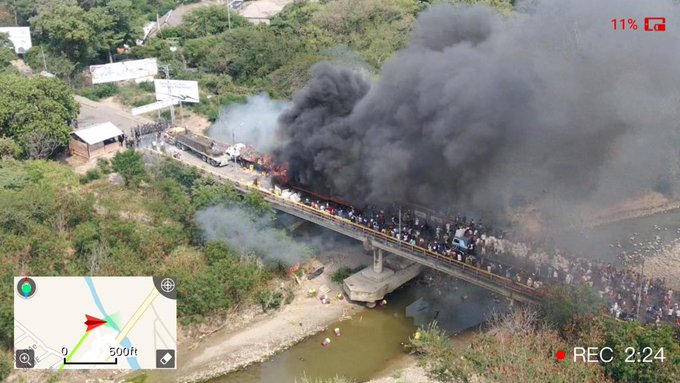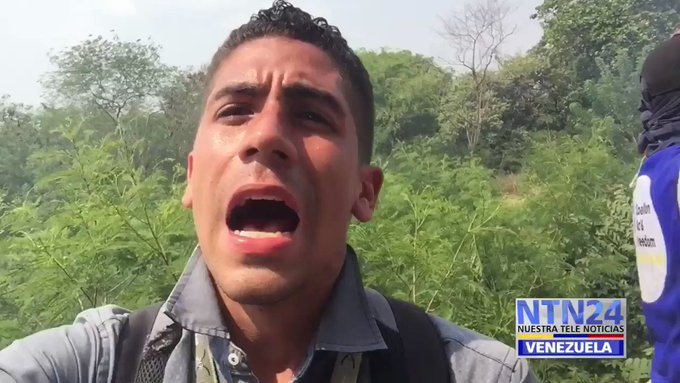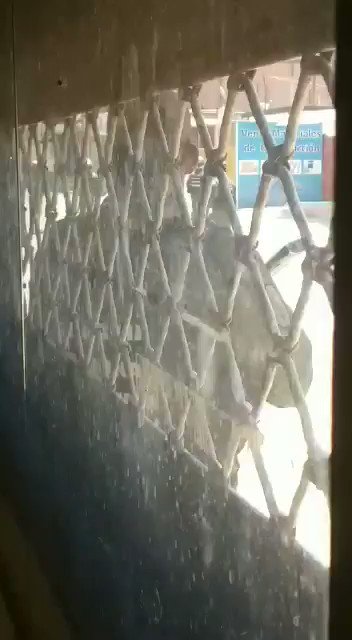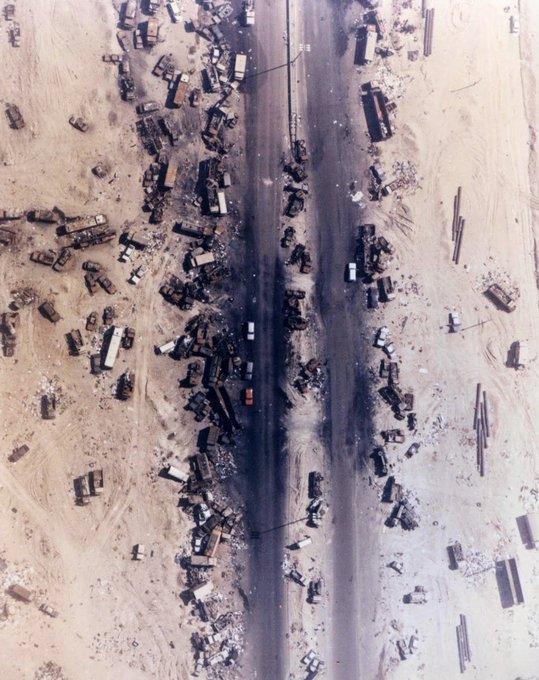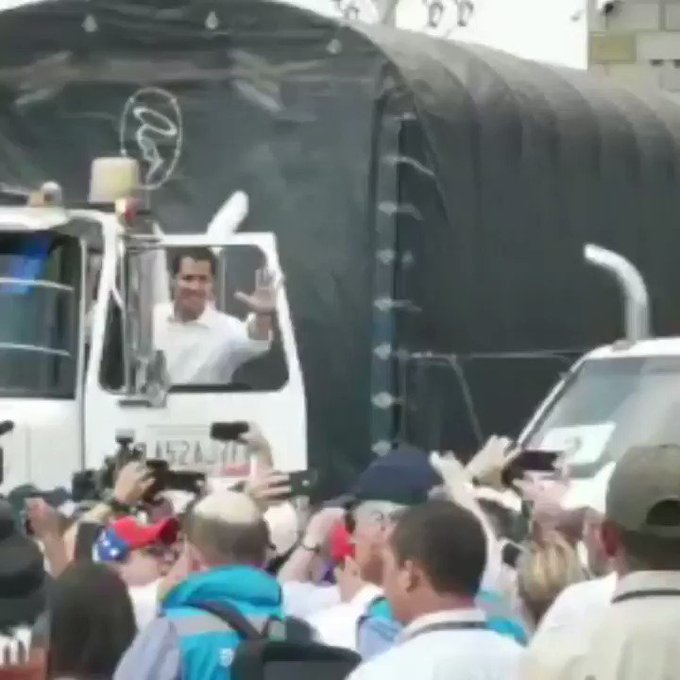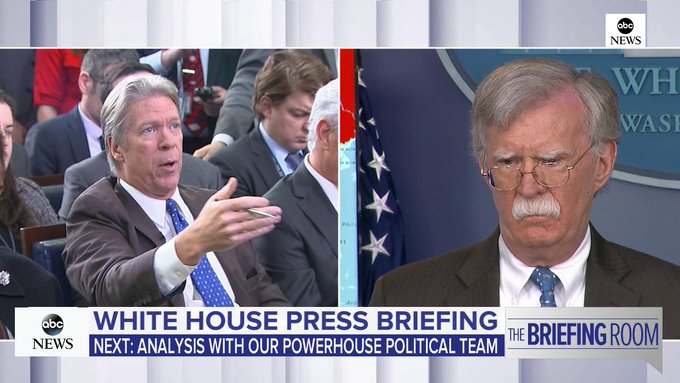In a well-fitted sports jacket, with one hand over his heart and the other clasping the constitution, the previously unknown Juan Guaidó declared himself interim president of Venezuela against democratically elected Nicolás Maduro. It was 61 years to the exact date since Venezuela's U.S.-allied dictatorship of General Marcos Pérez Jiménez fell. The difference this time? The United States has changed who is dictator, and thrown its weight behind the self-styled vanquisher.
Guaidó spoke to U.S. Vice President Mike Pence the night before his Jan. 23 proclamation, receiving
a pledge he would be supported by the U.S. government. After the White House’s immediate recognition, several countries quickly followed suit. Leading the trail of conservative Latin American governments from Argentina to Paraguay was Canada. The event was highly coordinated: Ottawa was alerted to Guaidó’s announcement prior, while Foreign Affairs Minister Chrystia Freeland congratulated him two weeks earlier for “unifying opposition forces,” the Globe and Mail
reported.
“I fail to understand why Canada is supporting yet another right-wing coup in Latin America, and why it is giving aid and comfort to Mr. Trump”
This is no revelation: since Aug. 8, 2017, Canada has assumed leadership of the Lima Group, an ad-hoc alliance that includes 14 (of 33) member states of the Organization of the Americas (OAS) that banded together to target Venezuela’s government when their attempts to do so within the OAS
failed. What is less examined is Canada’s singular interest in Venezuelan affairs. Its presence elsewhere in the region, especially in mining activities, and its economic allyship with the right-leaning countries of the Lima Group offer some explanation.
Dissent against Lima Group
The last Lima Group meeting, held in Ottawa on Feb. 4, featured the announcement that Guaidó and his opposition-controlled National Assembly would be joining the alliance. Canada also announced
new aid to countries neighbouring Venezuela, including Brazil, Peru and Colombia, as Freeland called on “all democratic countries” to join in Venezuela’s “peaceful transition.”
As Canada continues to drum up support for its position globally, a slow flicker of dissent across Canada has been fomenting — and it was evident at the last Lima Group meeting, where about 50 people showed up to protest. While Freeland spoke at the meeting’s closing press conference, two people rushed in front to unfurl a banner that read “STOP the plunder! OUT of Venezuela!” Based in Toronto, these Indigenous Mapuche women from Southern Chile are part of the Women's Coordinating Committee for a Free Wallmapu.
“Given the censorship of alternative media, we felt it was important to voice that not all Canadians feel the same way,” Y.A. Montenegro, one of the protestors, told Ricochet. Montenegro explained that accreditation for the press conference had been withheld from certain international media outlets, including Telesur, without explanation.
When Montenegro and the other protesters were escorted out, Freeland remarked that political protesters in Canada “enjoy a democracy” that political protesters in Venezuela do not.
“It’s really ironic, because they were literally censoring media groups,” Montenegro said of the foreign affairs minister’s response.
At the time of writing, Freeland’s press secretary, Adam Austen, had not responded to a second interview request.
Taking away right to vote
Under the Magnitsky Act and the Special Economic Measures Act, Canada has imposed three rounds of
sanctions on Venezuela, which have been
condemned by the United Nations Human Rights Council. Since 2017, it has also expelled Venezuela’s top diplomat, taken Venezuela to the
International Criminal Court, and
banned Venezuelan Canadians from voting in Venezuela’s May 2018 elections.
“I was going to vote at the Venezuelan Consulate in Vancouver,” Venezuelan-Canadian activist and writer Nino Pagliccia told Ricochet, adding that he was going to be a witness to the election as well. “When we were not allowed to vote, this came as a very big shock. This is a government taking away my right to vote.”
Pagliccia explained that Canada had declared the elections illegitimate before they had even taken place.
“I was very annoyed, frustrated and upset,” he said of the Canadian government’s actions, recounting how he has participated in nearly every federal, provincial and municipal election in Canada for the past 35 years he has lived in the country.
Canadian labour and civil society groups object
Elsewhere, progressive reaction to the Canadian government’s position has seen
opposition from organized labour, including Canada’s largest union, CUPE. The New Democratic Party has released a mixed set of responses, while Canadian NGOs like CoDevelopment Canada say that Canada’s actions are violations of both the OAS and UN charters.
“Canada has lost all of its credibility as a country that defends democracy and human rights.”
According to a former independent UN expert on the promotion of a democratic and equitable international order, Alfred de Zayas, who visited Venezuela in 2018 to assess the country’s crisis, international sanctions on Venezuela — including by Canada — have aggravated the situation and are “criminal,” violating multiple charters.
“This is a matter of the International Criminal Court, because this sort of behaviour is not only a violation of fundamental principles of international law, it entails violations of the UN Charter, OAS Charter (chapter 4, article 19), as well of the Statute of the International Criminal Court, article 7 of which defines ‘crimes against humanity,’” de Zayas told Ricochet through email. “Canada has lost all of its credibility as a country that defends democracy and human rights.
“To the extent that there has been an increase in maternal mortality, infant mortality as a result of the financial blockade and sanctions, Canada is complicit and has both civil and criminal responsibility.”
Canada on the international stage
While the Lima Group is relatively new, Canada has been supporting the opposition in Venezuela for at least two decades. As Yves Engler, political commentator and author of Left, Right: Marching to the Beat of Imperial Canada
writes, Ottawa has sent millions of dollars to opposition NGOs such as Súmate, inviting its leader, Maria Corina Machado, to Canada, shortly after a failed August 2004 referendum to oust the late Venezuelan leader Hugo Chavez, Maduro’s predecessor.
According to Todd Gordon, assistant professor of law and society at Wilfrid Laurier University and author of Blood of Extraction: Canadian Imperialism in Latin America, years of support to Venezuela’s opposition explain Canada’s role in the international arena as well as its interests in Latin America as a whole.
“The ideological commitment of the Canadian government to overthrow Maduro and promote the opposition in the country is because of its neoliberal and reactionary politics,” Gordon told Ricochet. “Canada is committed to the assertion of its powers in poorer countries in order to access their resources and labour.”
Comparing the United States to Canada, Gordon remarked, “It’s a bit more complicated for the U.S. to play the role (that Canada is) because it has way more baggage in the region.”
“Canada prides itself in being non-imperialist and appearing that way in international media,” he explained, adding that its leadership in the Lima Group and position on Venezuela seem less “aggressive” than the same one held by U.S. officials such as John Bolton or Elliot Abrams, because the Trudeau government perceives itself as “centrist.”
Canada’s actions in Venezuela have at least one watchdog worried. Mining Watch’s Latin America coordinator, Kirsten Francescone, told Ricochet that the organization’s “biggest concern” is that Canada’s moves in Venezuela “could potentially be an opening for Canadian mining companies.”
“A push to open up Venezuela could be a push to open up its resources,” Francescone said, explaining that Venezuela has the world’s largest oil reserves and that its gold mines in particular — with gold being the number one metal extracted by Canadian companies in Latin America — are of Canadian interest.
Canadian mining companies have already reaped benefits despite Venezuela’s ongoing crisis, having sued Venezuela for nationalizing its gold mining sector. According to a report to be published in February 2019 by MiningWatch Canada and the Institute for Policy Studies, companies including Crystallex, Rusoro and Gold Reserves Corp. have been awarded $2.9 billion in investment settlement dispute claims' awards, because of the Venezuela-Canada Bilateral Investment Treaty.
Canadian mining violence in Latin America
The presence of Canadian mining companies in Latin America, at least in part, explain its alliances and interests in the region, according to Francescone. The majority of mining companies in the world have their headquarters in Canada, while 41 per cent of the large mining companies in Latin America are Canadian.
According to a landmark 2016
report by the Justice and Corporate Accountability Project, a legal clinic associated with two Canadian law schools, Canadian mining companies contribute to violence and act with impunity in the region. The first investigation of its kind, the report documented 44 deaths, 403 injuries and 709 cases of criminalization involving 28 Canadian companies in 13 Latin American countries over a 15-year period.
Canadian mining companies have long been getting away with this, explained Francescone, because “there is no legal recourse, so companies are basically immune.”
“Our own policies encourage our companies to work abroad,” she added.
According to Gordon, whose book explores violent displacement due to Canadian extractivism in Latin America, countries whose economies are open to foreign investment are Canada’s allies. Unsurprisingly, these countries include those in the Lima Group.
The past year and a bit has seen a frenzy of elections in Latin America, from Honduras’s in November 2017 to, most recently, Brazil’s in October 2018. Canada’s response to these elections, and its overall relations with Honduras and Brazil — both part of the Lima Group — offer two compelling examples of the contrast in relations that Canada has had with Venezuela and why it is pushing for a change of government under the leadership of Guaidó.
Canada and Honduras: From coup to contested elections
The last Honduran election was met with widespread allegations of election irregularities. As protests erupted in its wake, at least 23 people were killed and hundreds more injured by the state’s subsequent quelling of the protests. The Office of the High Commissioner for Human Rights (OHCHR) had said the “excessive” and “lethal” force used by Honduran security forces “may amount to extra-judicial killings.”
Canada was slow to release any
statement, and when it did, it hardly contained an acknowledgement, let alone condemnation, of the incumbent government or its post-election violent repression. The muted response of a highly disputed election stands in stark contrast to Canada’s
statement on Venezuela’s May 2018 elections.
Canada’s response is unsurprising given its welcome of the 2009 military coup that ousted the democratically elected president, Manuel Zelaya. The prime minister at the time, Stephen Harper, was the first foreign leader to meet with the post-coup government led by President Porfirio Pepe Lobo. The announcement of the Canada-Honduras Free Trade Agreement came soon after.
When Zelaya was elected in 2006, he called for a ban on open pit mining, was redrafting the country’s mining law, and had put an end to new mining concessions. The coup arrived before the new mining law could be read before Congress.
Canadian mining corporations including Yamana Gold, Breakwater Resources and Goldcorp all have investments in the country, and have since at least 1998, when Honduras was opened up to 40 Canadian companies as part of a $100-million aid
scheme that Canada offered shortly after Hurricane Mitch ravaged the Central American nation. Since then, mining by Canadian companies has grown to become
90 per cent of all foreign investment in Honduras. The Justice and Corporate Accountability Project report links Canadian companies to one death, 10 injuries, 15 warrants and legal claims, and 85 arrests, detentions and charges.
“Honduras offers zero challenges in Latin America,” said Gordon. “It’s our friend and ally because the repression there is not a threat to Canadian economic interests.”
Deepening Canada-Brazil ties under Bolsonaro
South of Honduras, elections in Latin America’s largest country saw the far-right Jair Bolsonaro come to power in what was a stunning endorsement of his well-documented sexism, racism, homophobia and nostalgia for Brazil’s dictatorship years. Just weeks into his presidency, Brazil has already seen a rollback of policies spanning women’s rights, environmental protections, Indigenous rights and more.
While Freeland’s
statement following the October election was terse, it offered no criticisms, and instead pledged hope for the maintenance of “strong bilateral ties between the two countries.”
This collaboration was evident on Jan. 23, the day of Guaidó’s declaration as interim president, when several countries from the Lima group announced their endorsement of the Venezuelan leader from the World Economic Forum in Davos, Switzerland. Freeland stood alongside Bolsonaro, as well as Colombia’s President Iván Duque and Peru’s Vice President Mercedes Aráoz, as they shared their recognition on behalf of the alliance one by one.
Last month, Prime Minister Justin Trudeau sidestepped a question about his support of Bolsonaro at a town hall meeting, where he defended Ottawa’s policies towards Venezuela, Global News
reported.
Canada’s current alliance with Brazil is preceded by its support of the government of Michel Temer, the most
unpopular president in Brazil’s history, who came to power in 2016 after the impeachment of President Dilma Rousseff, which was widely regarded as a coup by many in Brazil.
Canada-Brazil relations soured under Rousseff when documents leaked by whistleblower Edward Snowden indicated that the Communications Security Establishment Canada had been
surveying the Brazilian Ministry of Mines and Energy. The more than 40 Canadian mining companies active in Brazil then were shortly put under suspicion.
According to Francescone, there are currently 70 Canadian-owned mining projects in Brazil, including that of the Belo Sun Mining Company, which has been mired in
controversy with regards to its Volta Grande project, which is expected to become Brazil’s largest gold mine.
“We’re particularly concerned about (the election of) Bolsonaro because he has been talking about deregulations that may open up the door for environmental disasters,” said Francescone. “We’re concerned about Canadian mining interests … under Bolsonaro.”
This year’s Prospectors and Developers Association of Canada convention — the Canadian mining industry’s largest annual convention — to be held in Toronto in March will feature
a whole day on Brazil. This, Francescone explained, is a pretty good indicator of the industry’s priorities in the upcoming year.
As CBC’s Chris Arsenault made clear in his
report following Bolsonaro’s election, “losses for the Amazon rainforest under Bolsonaro could spell big gains for Canadian investors.”
Another ‘right-wing coup’ in Latin America
As Canada continues to rack up support for its position through diplomatic means, a rising consciousness — both within and outside the country — is questioning the Liberal government’s true motives. While Canada’s history in Latin America hardly rivals that of the United States, its decades-long economic ties and emerging alliances are raising new questions.
For de Zayas, who was once a Douglas McKay Brown Chair in Human Rights at the University of British Columbia, Canada’s actions are “an absolute disgrace, a moral debacle.”
“I fail to understand why Canada is supporting yet another right-wing coup in Latin America, and why it is giving aid and comfort to Mr. Trump,” he stated.
“The only way out of the crisis is through international mediation and dialogue. That is what both the UN Secretary General António Guterres and the High Commissioner for Human Rights Michelle Bachelet want,” he continued. “They do not condone regime change imposed by the U.S. and a handful of rich countries.”
For Pagliccia, who calls both Canada and Venezuela home, Canada’s intervention is highly misplaced.
“It is a shame to see Canada do this.”
You might also be interested in...
FEDERAL ELECTION
Svend Robinson’s return to politics is good news
Gurpreet Singh January 23, 2019
SASKATCHEWAN
Truck driver isn’t the only one at fault in Humboldt tragedy
James Wilt February 6, 2019
LATIN AMERICA
Canada’s goal of overthrowing Venezuela’s government is decades old
Yves Engler January 31, 2019

BECOME A MEMBER
Ricochet produces independent journalism and ideas in the public interest. Support this experiment in crowdfunded news by becoming a member today.
* By continuing, you agree to be subscribed to our weekly newsletter.
SECTIONS
CANADA QUEBEC INDIGENOUS INTERNATIONAL PODCASTSOCIAL
FACEBOOK TWITTER INSTAGRAM FEED NEWSLETTER
RICOCHET
AboutAdvertisingWrite for RicochetWork or volunteer with usConfidentiality policyContact usSecured contactThe Wall

COPYRIGHT 2019. ALL RIGHTS RESERVED.

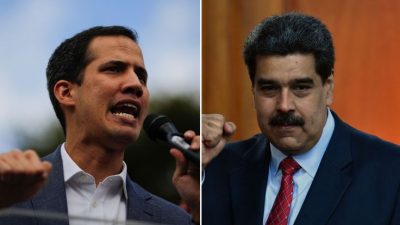





 COPYRIGHT 2019. ALL RIGHTS RESERVED.
COPYRIGHT 2019. ALL RIGHTS RESERVED.

